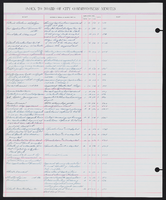Search the Special Collections and Archives Portal
Search Results
Sister Klaryta Antoszewska Photograph Collection
Identifier
Abstract
The Sister Klaryta Antoszewska Photograph Collection (1977-1991) consists of photographic slides that depict various Nevada, United States, and international nuclear test protests. The collection includes images of Sister Klaryta Antoszewska and Sister Rosemary Lynch, as well as images of the Lenten Desert Experience and numerous protests at the Nevada Test Site. Also included are images of nuclear testing, soldiers, and anti-nuclear testing promotional materials.
Archival Collection
Gay and Lesbian Community Center of Southern Nevada Photograph Collection
Identifier
Abstract
The Gay and Lesbian Community Center of Southern Nevada Photograph Collection contains mainly candid photographs of events and individuals affiliated with the Las Vegas-based Gay and Lesbian Community Center of Southern Nevada (GLCCSN) dating from 1993 to 2000. Photographs depict events honoring prominent members of the gay, lesbian, bisexual, transgender, and queer community; meetings at GLCCSN; and candidate nights for members of the community running for public office. The collection also includes a number of photographs of the Freedom to Marry celebration at the GLCCSN and the Gay Pride Las Vegas festival from 1998 to 1999.
Archival Collection
Beckley Family Photograph Collection
Identifier
Abstract
The Beckley Family Photograph Collection (approximately 1891-1982) consists of black-and-white photographic prints and negatives and color photographic slides. The images depict the Beckley family, their businesses in southern Nevada, and Las Vegas, Nevada as the city developed during the first half of the twentieth century. Also included are images of airplanes at the first Las Vegas airport Anderson Field, later renamed Rockwell Field in 1925, Fremont Street in Las Vegas, and postcards of mining towns across southern Nevada.
Archival Collection
William S. Park Photograph Collection
Identifier
Abstract
The William S. Park Photograph Collection (approximately 1870-1960) consists of black-and-white photographic prints and negatives of the families of William S. Park, John S. Park, and John William Park, as well as photographs of the Thomas children, half-siblings of John William Park's daughter Virginia. The majority of the images show locations in Las Vegas, Nevada with a smaller number taken in Kentucky, Oklahoma, Colorado, and California. Also included are three photograph albums of William S. and John William Park as children.
Archival Collection
University of Nevada, Las Vegas Office of the President Records
Identifier
Abstract
The University of Nevada, Las Vegas (UNLV) Office of the President Records is comprised of documents used in daily matters of the Office of the President from approximately 1950 to 2007. The records in the collection document the expansion of the UNLV campus, and the academic and athletics programs offered by the university.
Archival Collection





